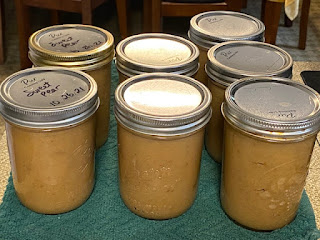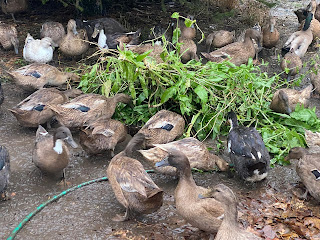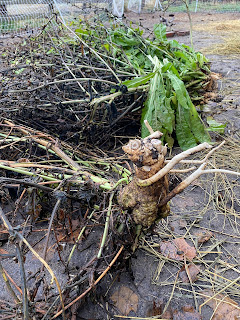In the Kitchen
Tried something new this fall and made perry! Perry is similar to hard apple cider. Apple cider is made with apples and perry is made with pears. I started the perry a couple of months ago when the pears were dropping off the trees and just bottled it up a couple of days ago. Now, it will age for a few months! Of course, I will be giving it a taste on Christmas...Perry Christmas!
Here is a brief look at how I made it. The first step was to make the pear juice. I used my steamer juicer for this step. The side benefit of this step is that it also pasteurizes the juice so I don't have to do this later. Yes, you can ferment unpasteurized juice but I like to start with a "clean" juice and add the yeast in a controlled manner (this is because I am a control freak).
Another benefit of the steamer juicer is that I took the juiced pears and ran them through a Squeezo Strainer (thank you Julie Skinner) and made some pear sauce! I will use this for baking. It is great for eating too but Mark prefers applesauce. Now, I can use the pear sauce for baking and keep all our applesauce for eating. Win! Win!Back to the perry...after collecting the juice, I checked the specific gravity with a hygrometer. This is a measure of the sugar that is in the juice. The yeast will eat the sugar in the pear juice and turn it into alcohol. One thing of note: the yeast feed on fructose. Pears contain sorbitol sugar in addition to fructose. The fructose is "eaten" but the yeast cannot eat sorbitol. Therefore, perry should be naturally more sweet than apple cider because of the sorbitol. I love this about pears!

I added the yeast and let it work...
In the Herb Garden
When the temperatures get cool, I pull up the chicory plants in the food forest and herb garden and process the roots. I wash them, dehydrate them, roast them and then grind them. I had read that chickens like chicory greens and that is why I planted them initially. I didn't even know that the roots could be used! Chicory is a caffeine free coffee substitute. It brews a rich dark roast with a robust flavor and a slightly woody, nutty taste. I like to put a little cinnamon, sweetener and milk in mine. I wrote a blog post about making chicory coffee a couple years ago and you can find it HERE.
I gave the ducks the tops of the chicory to eat and they just LOVED it! Here is a picture of before they ate it...
Here is a pic of the chicory after they were done. They pretty much stripped all the leaves off.Here I tried to get a pic of some of the roots...this is a perennial plant so it produces a large tap root!
Some benefits of chicory:
CHICORY INULIN POWDER (Cichorium Intybus) – Extremely high in inulin, an important prebiotic fiber that supports gut health
HIGH DIETARY FIBER | SUPPORTS DIGESTIVE HEALTH – This dark roast coffee with naturally occurring inulin fiber, helps boost fiber intake, and promotes the growth of key gut bacteria essential for healthy digestion
CAFFEINE FREE COFFEE SUBSTITUTE – Features a delicious, roasted coffee-like taste, and supports a healthy alternative to hot caffeinated drinks. Perfect for coffee lovers! You can also mix some chicory into your coffee grounds to lower the caffeine and acidity of your coffee.
Cheers!
~Denise







No comments:
Post a Comment